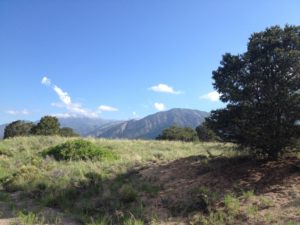 Like many others, I’m living in-between.
Like many others, I’m living in-between.
For four and a half years, I’ve held what Susan Sontag called “dual citizenship” in the kingdoms of the sick and of the well. I shuttle between the limits of illness and the opportunities of ongoing life. I anxiously hold my breath when, every three months, I wait for test results; I gratefully exhale when I get another reprieve from treatment.
My vocation is in flux. I’m between settled and changing roles, between familiar and new responsibilities, and between comfort-zone and learning-curve.
I’m between the “prime of life” and my “golden” years—somewhere between “is,” “was,” and “has been!”
For longer than I recently realized, I unconsciously assumed that I’d move through in-between to next—from ambiguity to clarity and uncertainty to certainty. That’s not going to happen. What’s certain is uncertainty; what’s settled is unsettledness.
I live, and will continue to live, in permanent temporariness, perpetual transition, and ongoing in-between. There’s peace and, even, joy in a embracing, rather than resisting, that reality.
Another name for in-between is wilderness. The Hebrew people, liberated from Egyptian slavery, spent forty years in the wilderness, before they made it to their hoped-for destination. They journeyed and camped, wandered and worshipped, circled and doubted, desired and despaired. After four decades, their sojourn finally ended.
Not everyone made it.
Some who left the house of bondage never arrived in the home of promise. They died in the wilderness. Even Moses, who led them to the brink of hope’s realization, did not live in its fullness.
Wilderness is a place, but it is also a condition: it’s the arid land between original blessing and final wholeness.
We can long for a community to which we never belong and yearn for a home in which we never live. Worship doesn’t always happen in a finished temple; it often takes place in a provisional tent of meeting, pitched in the desert.
Some wounds heal, but leave disfiguring scars; some injuries leave us with a limp; and some traumas return to haunt us when we feel especially vulnerable.
We have questions for which we don’t receive satisfying answers. There are dreams that don’t come fully to fruition, even if they aren’t utterly shattered. There’s a gap between potential and achievement.
Almost none of us is a stranger to wilderness; we all go there. Some of us get to stay.
For as long as I’m here, I want to focus on what remains more than on what is lost, gratitude more than grief, beauty more than pain, and love more than fear. I also hope to encourage those who are moving through wilderness toward promise and to help those who are in the desert for just a while on their way to what is next.
This wilderness isn’t just necessary; it’s a good gift and a glad calling.
And I know it’s true everywhere, including in permanent temporariness, “that nothing separates us from the love of God.”

Thank you, Guy
You are absolutely so right. Different wildernesses, but the result is still distress, unless we stop and realize God is there wit us. Thank you Guy.
Thanks from a reader who is feeling very in-between at the moment as I wander through the wilderness of an empty nest and retirement from a career of 40 years.
My best friend of 43 years is living in the wilderness which means her beloveds are too. Every test, every cough, every anomaly breaks the uneasy peace in which we live.
Guy,
Thank you for sharing your wilderness. I am wandering and wondering through my journey with grief. I feel stuck most times as if I have just begun. Other times, I see progress. So many questions, which I know won’t be answered on this side of life. One day we will know, so I trust in our God that he knows just where I am and will watch over me until then. May God continue to bring you his gift of wisdom. Your words seem to give us all clarity with our own journeys.